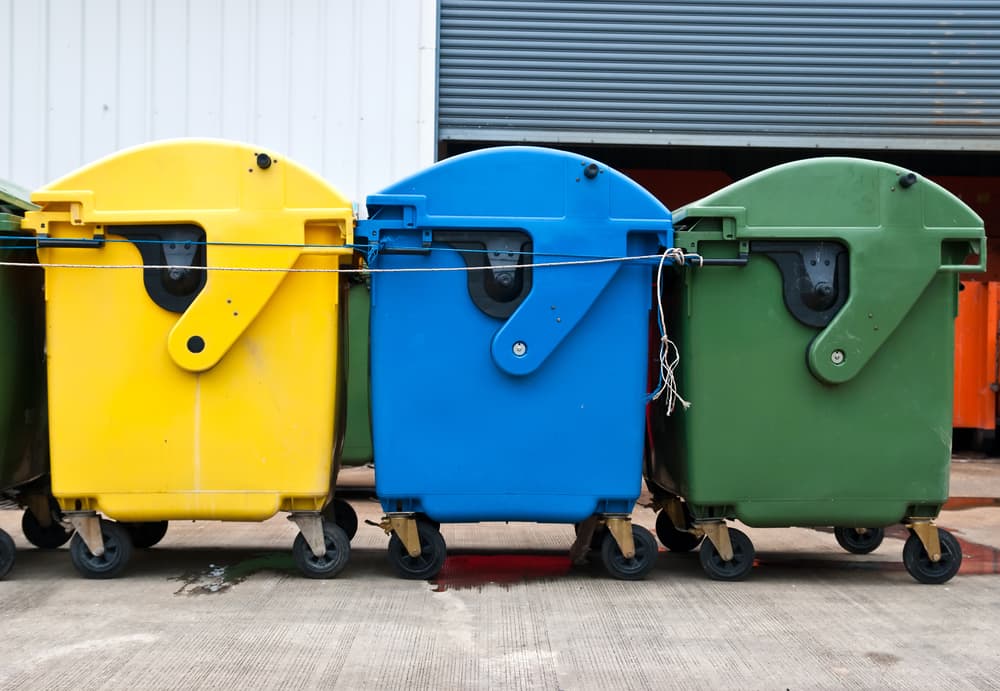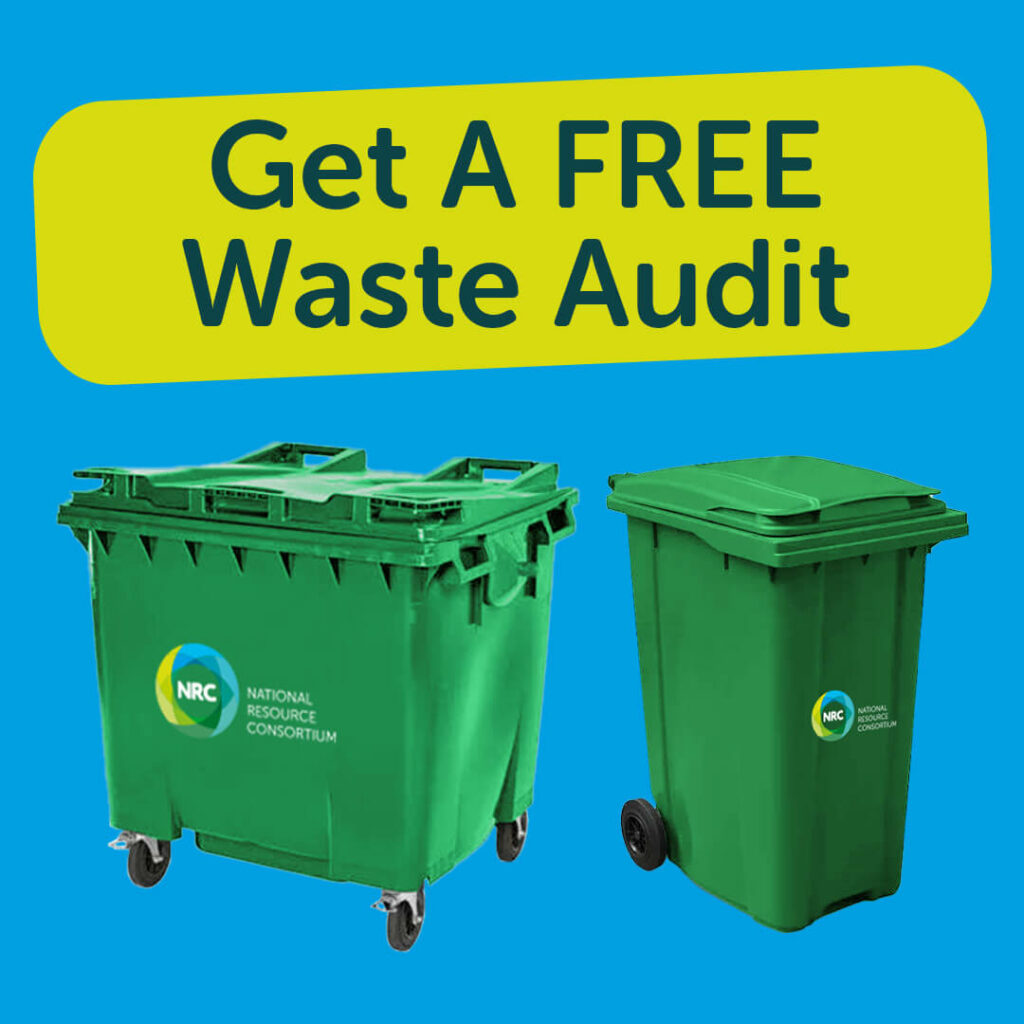May 9th, 2024

In today’s world, where the “throwaway” culture is no longer an option, businesses have a big role to play in sustainability. No matter what industry you work in, commercial waste is unavoidable. But that’s not to say it can’t be reduced.
So, how can we make sure our businesses are doing everything they can to cut down on unnecessary waste?
The good news is, if you’re reading this, you’re already on the right track towards making a positive impact on both your bottom line and the planet. Whether you’re a bustling SME or a corporate giant, and whether you’re dealing with confidential, plastic or electronic waste – we’ve got some tips that can help shrink your carbon footprint, boost your brand and save you money. Let’s get into it.
This guide covers:
Benefits of Reducing Your Business Waste
Reducing business waste offers many benefits that go beyond just being better for the environment. It also saves money, creates new revenue streams, boosts employee pride, provides a competitive advantage, and safeguards compliance.
Focusing on waste reduction is a responsible and sustainable practice that helps protect the environment. By decreasing the amount of waste generated, businesses can contribute to reducing their carbon footprint, conserving natural resources, and minimizing pollution.
But it doesn’t stop there, reducing waste can also lead to cost savings. Anything from waste disposal costs to packaging waste can be expensive for businesses. By implementing strategies to minimize waste, businesses can make significant financial savings over time.
Waste reduction even offers opportunities for businesses to create new revenue streams. For example, when businesses recycle materials instead of sending them to landfill sites, they can sell the recycled products or use them as inputs for their own operations.
Businesses that demonstrate a commitment to reducing waste gain a competitive advantage. Customers and clients are increasingly selecting companies that prioritize sustainability, giving these businesses a positive brand image and a larger customer base. Employees also often take pride in working for environmentally-conscious organizations that prioritize sustainable practices.
Lastly, embracing waste reduction safeguards compliance with waste management regulations. By adhering to laws and regulations surrounding waste disposal, businesses can avoid legal issues and reputational damage.
Top Tips For Reducing Business Waste
Reducing business waste is not only beneficial for the environment but can also have a positive impact on a company’s bottom line. So how can you see these differences in your business? Here are a few handy tips.
Get a Waste Audit
A waste audit is a crucial step for businesses looking to reduce waste and its environmental impact. Conducting a waste audit involves analyzing the volume and type of waste generated by a business, providing valuable insights for implementing waste reduction strategies.
At NRC, we offer our waste audits completely free of charge. Just give our teams a call and we will come to your site at a time that suits you. Once we’ve carried out the waste audit, we will be able to suggest an efficient, cost-effective and sustainable solution for your waste management processes.
Buy in Bulk
One effective way for businesses to reduce waste is by buying in bulk. A main advantage of buying in bulk is the significant reduction in packaging waste. When products are purchased in large quantities, the need for excessive packaging is greatly reduced. This means fewer cardboard boxes and single-use plastics that contribute to environmental pollution and landfill waste.
Plus, as an added bonus, buying in bulk can also help reduce carbon emissions. By purchasing larger quantities at once, businesses can minimize the frequency of deliveries or shipments. This leads to fewer transportation trips and ultimately lower carbon emissions resulting from transportation activities.
Bulk bags, in particular, provide additional benefits when buying in bulk. These bags are designed to be reusable and durable, allowing businesses to use them repeatedly instead of relying on single-use packaging. Additionally, bulk bags are often made from recyclable materials, further contributing to waste reduction efforts.
Not only are bulk bags environmentally friendly, but they are also cost-effective and space-efficient. Bulk purchases often come at a lower unit cost compared to buying individual items. This allows businesses to save money in the long run while reducing waste. Moreover, the ability to store products in bulk bags saves valuable space in warehouses or storage facilities.
Anaerobic Digestion (AD)
AD is an effective and sustainable method for reducing business food waste. Organic waste sent to landfills produces methane, a potent greenhouse gas that contributes to climate change. This practice will soon be illegal as new regulations are introduced in 2025. AD instead allows the materials to break down using a natural process that creates heat allowing bacteria to turn food waste into a highly effective digestate that is used to replace fertilizers and methane – that is converted into electricity. This helps businesses achieve a more sustainable waste management strategy, promoting environmental responsibility.
Setting up a food recycling program in a business environment is easy. First, designate an area or provide dedicated bins where employees can easily collect organic waste. Educate employees on what can be composted, such as fruit and vegetable scraps, coffee grounds, and non-greasy food leftovers. Proper signage and clearly labelled bins can help ensure that the organic waste is sorted correctly.
After that, all you need to do is give us a call and we will come to collect it.
Reuse and Repair
By reusing items and investing in reusable alternatives, businesses can significantly decrease the amount of waste they generate and minimize their environmental impact.
One effective way to reduce waste is by encouraging the reuse of items. Rather than purchasing new products, businesses can explore options for refurbishing or repairing existing equipment and furniture. Whether it’s IT equipment or the break room chairs, by extending the lifespan of these items, companies can reduce the waste stream and save valuable resources.
Another approach is to prioritize the use of reusable alternatives. Instead of relying on single-use items, businesses can invest in durable, long-lasting products that can be used repeatedly. For example, using reusable bottles, coffee cups, and cutlery can eliminate the need for disposable options, thus reducing plastic waste.
Get the Right Bins
Getting the right bins for your business waste management strategy is a big part of effective waste reduction and environmental sustainability. By providing the appropriate bins, businesses can encourage waste segregation and ensure that recyclable items are sent to the correct recycling facilities.
Businesses should provide a variety of bins tailored to different waste types. Recycling bins for paper, plastic, and glass are essential for diverting recyclable materials from the general waste stream. Additionally, separate bins for organic waste, such as food scraps, can be used for composting. General waste bins can be used for non-recyclable items that cannot be composted.
To further improve waste segregation, consider placing recycling bins next to each office cubicle or workstation. This accessibility makes it convenient for employees to dispose of their waste correctly and promotes sustainable practices throughout the workplace.
We have a full range of bins available for hire at NRC that can help you increase your business’s recycling rate. Get in touch with our experts today and we can set you up with what you need.
Engage Employees
One of the most effective ways to reduce waste in your business is to engage your employees. By involving staff from the beginning, businesses can create a culture of sustainability and empower individuals to make a positive impact.
Providing clear signage and educating employees about the benefits of your waste management system will encourage them to treat it as a priority. If you opt for a new bin system, make sure there is clear signage, they are easily accessible and that they fully understand what each bin is for, whether it’s recycling, food or general waste.
Furthermore, giving staff reusable bottles and cups is an effective way to reduce single-use plastics and encourage sustainable practices. Businesses can provide branded reusable bottles, water coolers, and coffee stations to encourage staff to avoid disposable options.
Lastly, running a recycling awareness day can help educate employees about the importance of waste reduction and recycling. This can include educational and interactive sessions that provide information on how the company’s waste management strategy aligns with environmental goals.
Engaging employees in waste reduction initiatives not only benefits the environment but also creates a sense of purpose and pride among staff. By implementing these strategies, businesses can foster a culture of sustainability and make a positive impact on their waste management practices.
Monitor Printing
Paper waste is one of the largest waste types produced by businesses. This can be effectively reduced by monitoring your printing practices.
Print management software enables businesses to monitor the volume and type of printing being done within the organization. By having this visibility, businesses can identify areas where wasteful printing practices may be occurring and take necessary steps to address them.
A key strategy is to set printing defaults to double-sided and black-and-white printing. This simple adjustment significantly reduces paper and ink consumption, leading to substantial waste reduction. Additionally, businesses can limit unnecessary printing by encouraging employees to review documents digitally before deciding to print.
Promoting digital document sharing is another effective approach. Utilizing collaboration tools and encouraging employees to share documents electronically not only reduces printing but also enhances productivity and efficiency.
Business Waste Management at NRC
In simple terms, reducing your business waste is good for not only the environment but your company’s image too. If you’re looking for support in managing your waste streams more efficiently and sustainably, then we’ve got the waste solution you’ve been looking for.
Through our free waste audits, we suggest smart, money-saving and eco-friendly solutions that fit your company’s specific needs. By teaming up with NRC, you’re not only helping the planet but also ensuring your business stays competitive and compliant.
So, why wait? Connect with NRC today, and let’s start this journey toward a cleaner, greener, and more profitable future together. Remember, reducing waste isn’t just the right thing to do; it’s the smart thing for your business. NRC is here to make it easy for you.





